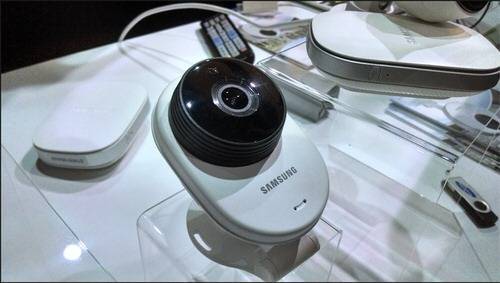
Thirty years after one of the first wars for your home, another digital standards battle is brewing among Internet of Things providers.
Samsung, Intel and Dell announced Monday that they are combining forces to create a new wireless standard for the Internet of Things, connecting sensors, appliances and gadgets to the Internet in your home, business and automobile. The Open Internet Consortium will include hardware component builders Broadcom and Amtel as well as embedded software provider Wind River.
See also: Future-Proofing The Smart Home: Staples Thinks It Has The Answer
The Open Internet Consortium aims to battle the Qualcomm-led, open-source AllSeen Alliance, which provides its own wireless standard for the Internet of Things. It will also take on the Industrial Internet Consortium led by old technology industry titans like AT&T, Cisco, General Electric and IBM. Intel is a member of both the Open Internet Consortium and the Industrial Internet Consortium; this sort of cross-consortium membership isn’t unusual for companies who want to make sure they’re on the winning side of standards battles no matter what.
Apple and Google are also are dabbling in the connected home and vehicle spaces with their iOS and Android operating systems, respectively.
No Standard Rules Them All
Consumers have been subjected to confusing standards battles before, especially in the home. HD DVD battled Blu-ray and lost in the war for high-quality movies on optical discs. Betamax fought VHS in the video cassette wars of the 1980s but lost the war, largely because VHS offered longer recording times and was favored by pornographers.
The so-called Internet of Things is about to explode as technology originally built for smartphones spreads across industries. Everything that can be connected to the Internet and can communicate with other devices will be online within the next decade. Your home, you car, your thermostat and probably even your toaster. Gadget makers, marketers and advertisers all see a burgeoning new technology and don’t want to be left out of the billions of dollars that will be generated once the Internet of Things becomes a reality.
Hence we now see a fragmented ecosystem of competing standards and interests all vying to be the dominant group for the next wave of technological evolution.

Qualcomm is likely the early leader in this new standards race. The AllSeen Alliance has 51 members, including Microsoft, which joined last week. Qualcomm and its partners are already making connected devices like speakers, lamps, smoke detectors and even cribs. The new Open Internet Consortium will have some catching up to do.
Wireless standards for the Internet of Things will be incredibly important going forward. Consumers will need to make sure that the devices they are buying are compatible with the other devices they already own. The smartphone will become the remote for all other the gadgets in your life and it will need to be able to communicate with each one as simply and efficiently as possible.
Images courtesy of Intel and Samsung

















